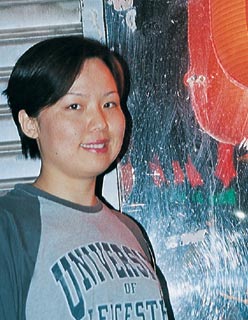| Trading Places |
| http://www.sina.com.cn 2004/11/24 18:28 thats China |
Going West
 Going West Chinese students continue to head abroad for educational opportunities but more and more are bringing those experiences back home By Yap Su-Yin When Chu Mengmeng left China for her postgraduate studies in Melbourne in 2000, she was fulfilling her dream - and her parents' hopes - that an overseas education would help her clinch a good job in the future. "Employers in China worshipped a foreign degree," she says. "If you had one, it was easier to get ahead in your career." Less than a month after she returned home with a Masters in Applied Linguistics from the University of Melbourne, Chu secured a well-respected job as an English language teacher at Renmin University of China in Beijing, one of China's top institutions. In this country where the income for a university professor used to be lower than that of an ordinary worker, overseas degrees have long been considered as particularly valuable. Since China opened its doors to the world over two decades ago, more than 580,000 students have inundated foreign universities in over 100 countries, according to the latest statistics from China's Ministry of Personnel and Education Ministry. The numbers continue to climb: In 2001, just under 100,000 Chinese students were studying abroad. In 2002, it grew to 125,000. Though the numbers dipped slightly last year because of SARS, they're expected to remain high in 2004. Good teaching quality, research opportunities, a rich student life and a nurturing environment for independent thinking all add to a tantalizing draw. "Studying abroad enriched my life," says Chu. "It changed my personality. I used to be afraid to speak up for fear of offending others. After my studies in Australia, I'm more confident and extroverted. I don't feel as restricted to express my views as before. "Another way I've grown is that in China, I studied for the sake of studying. We stuck to the books. In Australia, we search for our own materials; we are encouraged to ask questions. The engaging way the course was taught fueled my genuine interest in language teaching." For Maggie Lin, two years in London pursuing a postgraduate degree in Marketing from the University of Leicester meant being exposed to different perspectives, people and cultures. "We don't get that chance in China because here, we only experience a single-culture environment," says Lin, now a headhunter with DND Consultancy. "Being educated in two different systems enhanced my ability to think in broader terms. It opened my mind. I learned to deal with 'difference.'"
 Maggie Lin For the longest time, the most popular choice for students has been the United States. "In the early nineties, the smartest Chinese went to the States because an average U.S. university was better than some of the best universities in China," says Nan Tu, 34, who has a doctorate in Industrial Engineering from the University of Minnesota. Nan spent a decade in America - six years for his doctorate, and four years to work. This year he came back to China, where he currently works as a visiting researcher for Microsoft Research Asia in Beijing. The numbers support Nan's view: Throughout the 1980s and 1990s, the number of registrants for the TOEFL (Test of English as a Foreign Language) - a prerequisite for entrance into American institutions - was over 100,000 per year. |
|
|
|
|
|
| Annotation |
| 新闻查询帮助 | |
| 热 点 专 题 | ||||
| ||||
|
教育频道意见反馈留言板 电话:010-62630930-5178 欢迎批评指正
新浪简介 | About Sina | 广告服务 | 联系我们 | 招聘信息 | 网站律师 | SINA English | 会员注册 | 产品答疑
Copyright © 1996 - 2004 SINA Inc. All Rights Reserved
版权所有 新浪网![]() 北京市通信公司提供网络带宽
北京市通信公司提供网络带宽